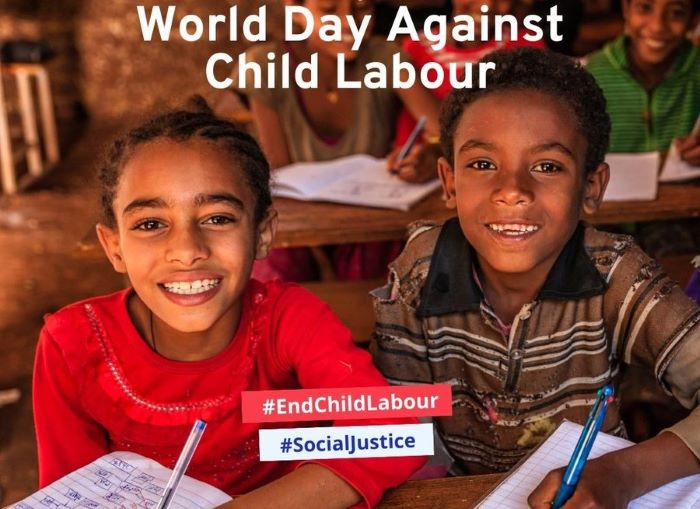
United States, the only country in the world that has not ratified the United Nations Convention on the Rights of the Child
Washington
In the United States, child labor is common as the country fails to take real actions to protect its young. As World Day against Child Labor was observed on Monday, the United States is the only country in the world that has not ratified the United Nations Convention on the Rights of the Child, should seriously examine its problem of rampant child labor and take action to protect the children.
CHILD LABOR COMMON IN U.S.A
The United States has seen a 69 percent increase in children employed in violation of child labor laws since 2018, according to the U.S. Department of Labor. Farming is a sector where child labor runs rampant.
Estimates by the Association of Farmworker Opportunity Programs suggested that there are approximately 500,000 child farm workers in the United States. Many of them start working as young as age 8, and 72-hour work weeks — more than 10 hours per day — are not uncommon.
Furthermore, a report by the U.S. Government Accountability Office suggested that 100,000 child farm workers are injured on the job every year and that children account for 20 percent of farming fatalities.
Child labor is also not uncommon in other industries. For example, a recent federal investigation into Guatemalan children working in the United States in violation of child labor laws has expanded to include meatpacking and produce companies that have allegedly hired underage migrants in at least 11 U.S. states.
As the problem of child labor plagues the country, some lawmakers are seeking to loosen child labor laws instead of taking much-needed actions to enhance protection of the children.
Lawmakers in several U.S. states are embracing legislation to let children work in more hazardous occupations, for more hours on school nights and in expanded roles, including serving alcohol in bars and restaurants as young as 14, said a report by The Associated Press.
“The consequences are potentially disastrous,” Reid Maki, director of the Child Labor Coalition, which advocates against exploitative labor policies, was quoted as saying. “You can’t balance a perceived labor shortage on the backs of teen workers.”
A total of 10 U.S. states have considered bills to loosen child labor restrictions in the last two years, said a report from the World Socialist Web Site.

SYSTEMIC OPPRESSION AGAINST CHILDREN
Despite the appalling situation, child labor issues seem the elephant in the room for U.S. legislators and politicians. Though the Fair Labor Standards Act (FLSA) was passed in 1938 in the United States, it did not ban child labor in the country.
Under U.S. labor law, children above 12 can work unlimited hours on farms of any size with parental permission, as long as they do not miss school, and those above age 16 working in agriculture can do jobs experts deem particularly hazardous. There is no minimum age for children to work on small farms or family farms.
Some may argue that U.S. child labor in agriculture is legally protected under the FLSA. Nonetheless, despite rapid technological and automation advancements, and mounting evidence of occupational hazards, the act has remained essentially unchanged since its adoption in 1938.
Besides, punishment for child labor violations stipulated by the FLSA is so trivial that some employers may have deliberately chosen to take risks.
Under the act, a packaging and hygiene company with an annual revenue of over US$450 million was merely fined US$1.5 million for illegally hiring over 100 child laborers, without any criminal charge.
“In the U.S. system, oftentimes the monetary risk for labor rights violations is relatively small so it might be seen as a cost of doing business,” Dieter Waizenegger, executive director of SOC Investment Group, was quoted by Reuters as saying.
The systemic oppression against children leads to the ironic fact that in the United States, a self-proclaimed “beacon of human rights,” you have to be 21 years old to buy cigarettes, but only 12 years old to work on a tobacco farm with parental consent.
A LINGERING PROBLEM FOR U.S.A
Child labor has been a lingering problem for the United States as the country is reluctant to take concrete actions to protect the children.
Forms of child labor, including indentured servitude and child slavery, have existed throughout American history, and the number of child laborers across the country peaked in the early decades of the 20th century, according to The University of Iowa Labor Center.
With parents’ consent, children are allowed to be legally employed in many fields. Parents’ right to take advantage of the productive capacity of their children is long recognized in the country. Children are more the property of their parents worth exploiting than a vulnerable group that ought to be protected.
The lack of commitment to end child labor is not confined to U.S. borders. Among all members of the International Labor Organization, the United States has ratified fewer conventions than most other countries.
The unwillingness to rectify the convention is “an epic failure on the part of our country,” said Rebecca London, an associate professor at the University of California, Santa Cruz, together with Catherine Ramstetter, founder of Successful Healthy Children.
______________
Courtesy: TeleSur (Posted on June 12, 2023)